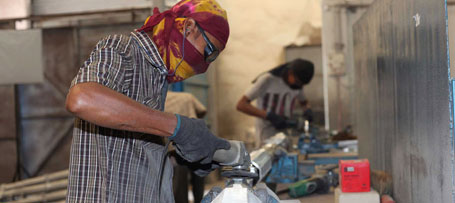
Due to its high strength-to-weight ratio, aluminum is naturally lightweight and corrosion-resistant, making casting it an important process in many fields, from aircraft to the car industry. But mistakes can happen even with the best metal casting services, which can affect the end product’s quality, safety, and ability to work. The key to making solid cast parts is to understand these flaws and learn how to avoid them.
We will talk about three of the most common flaws in aluminum casting: porosity, shrinking, and hot tearing. We will also gives you useful tips on how to avoid them.
1. Porosity
What it is:
Porosity refers to small holes or gaps in the casting caused by trapped gas or shrinking as the metal hardens. It can weaken things mechanically, break pressure systems, and make surfaces look bad.
Causes:
- Air that got trapped during mold filling
- Hydrogen gas is mixed with the aluminum melt.
- Stormy flow while pouring
- Improper gating system design
Solutions:
Degas the molten aluminum: Use argon or nitrogen gas to get rid of the hydrogen in the melted aluminum.
Make the methods for gating and filling better: Make the flow line smoother to reduce noise.
Control mold temperature and cooling rate: Keeping the temperature stable helps keep gases from suddenly expanding or contracting.
Use vacuum or pressure-assisted casting: These methods make it less likely that gas will get stuck.
Preventative Measures:
Choose Aluminum casting services that offer advanced degassing and use simulation software to optimize flow and solidification.
2. Shrinkage
What It Is:
Shrinkage flaws happen when there isn’t enough liquid metal to make up for the volume loss that happens when the metal solidifies. It causes holes inside or outside the structure, which weaken it.
Causes:
- Bad design of the feeding system
- Quick cooling in thick parts
- Not enough steps (reservoirs for liquid metal)
Solutions:
Design with the right risers: Risers supply liquid metal while it solidifies, which fills in any gaps.
Use chills carefully: Metal chills speed up the solidification process in certain places so that shrinkage moves toward the riser.
Improve part geometry: Fix the shape of the part by avoiding sharp corners and changes from thick to thin that make the cooling uneven.
Preventative Steps:
Before casting starts, reliable aluminum casting services use 3D models and temperature analysis to find areas that might shrink.
3. Hot Tearing (Hot Cracking)
What it is:
Hot tearing is a crack that happens when the metal is weak and is stressed by uneven cooling or mold control while it is solidifying. It usually shows up as sharp cracks in the casting.
Causes:
- Lots of differences in temperature
- Bad casting concept with rough changes
- Rigid frames that stop metal from expanding
- Choice of alloy that doesn’t stand up well to hot tearing
Solutions:
Redesign cast geometry: Change the shape of the cast so that the wall thickness is even and there are no rapid changes in section.
Use bendable cast materials: These can shrink a little when they touch metal, which lowers the stress inside the mold.
Choose metals that don’t tear easily when heated: Most of the time, alloys with silicon or magnesium work better.
Control the rate of cooling: Less thermal stress is caused by slower, more even cooling.
Preventative Steps:
Work with aluminum casting services that can help you with design and metal choice to stop hot tearing before it starts.
Additional Tips for High-Quality Castings
Warm up the molds first: This lowers the risk of thermal shock and helps control the cooling rate.
Regularly check: To find problems inside things quickly, use X-rays, ultrasonic tests, or dye penetrant methods.
Use coatings and modifiers: These can help make the surface better and stop gas from absorbing into it.
Train the operators: Having skilled workers who know how to handle the process can make a big difference in lowering the number of casting errors.
Why Professional Aluminum Casting Services Matter
It’s not enough to have the right materials for defect-free casting. You also need the right methods, tools, and knowledge. Aluminum casting services with a good reputation bring years of knowledge, innovative simulation tools, and tight quality control to every job. Working with the right service provider will make sure that your castings are both useful and reliable, whether you need to make a lot of them or customized ones that are very complicated.
With proper planning, design adjustments, and quality aluminum casting services, these issues can be detected early or avoided altogether.
